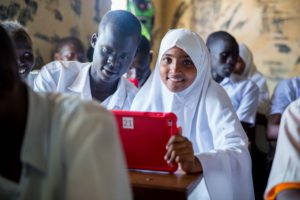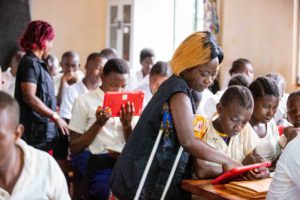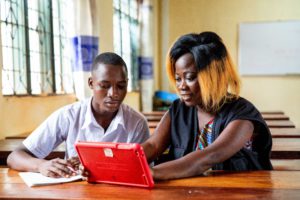
Jiaqi Wang
Description
The Instant Network Schools (INS) programme is a pioneering, holistic and human-centred model of effective use of technology to support quality education for refugees and host communities. Instant Network Schools provide an end-to-end Connected Education solution including power, connectivity, Vodafone Foundation’s Instant Classroom, digital educational content, teacher training, a coach to support teachers in delivering interactive lessons and technical support from a dedicated team at Vodafone Foundation and Vodafone employees volunteers in partnership with the UN Refugee Agency (UNHCR).
Context
Every boy and girl should have access to quality education (SDG4). In 2021, there are 80+ million refugees or displaced people worldwide of whom 40% are children. With an average stay in camps of 20 years, this means children can be born and do their entire schooling in a camp often located in remote and isolated areas with limited access to the outside world. Schools in camps are often overcrowded, lack basic infrastructure, trained teachers and educational material such as books. For almost half of child refugees, education remains out of reach (48% are out of school) and access decreases as children go up the education ladder with only 31% of refugees accessing secondary school against a global average of over 60%.
The Instant Network Schools (INS) programme is the fruits of a public-private partnership between Vodafone Foundation and UNHCR. INS has become the flagship programme of UNHCR’s Connected Education. Beyond providing technology and financial resources, Vodafone Foundation has been intimately involved in the project design, implementation, and monitoring. This transparent relationship has enabled UNHCR to leverage the expertise of Vodafone Foundation’s dedicated team with a rich mix of humanitarian and business background and a group trained Vodafone employee volunteers who assist with the technical setup and trainings side by side UNHCR in the field. This has been instrumental when trouble-shooting technical obstacles and reaching out for further partnerships. Vodafone Foundation has also leveraged its unique access to Vodafone’s network, partners and suppliers to provide in-kind support for connectivity, hardware and software.
Being holistic and human-centred designed, the programme focuses not just on increasing access to technology but on empowering teachers and maximising the impact of technology in the classroom to ultimately improve learning outcomes for students. The programme delivers training on classroom management, child-centred pedagogies and exploratory learning methods, to help support a gradual lasting transition in teaching methods. The INS programme is largely based on Vodafone Foundation’s innovative Instant Classroom, an in-house developed classroom-in-a-box which includes a projector, laptop, 25 tablets, an educational content server, online safety tools, a 4G modem and batteries to run the kit for a day. Instant Classroom was developed to overcome logistic and procurement challenges in rolling-out and is now used by other organizations and educational programmes supported by Vodafone Foundations beyond refugee camps in Africa.

Technical details & Operations
INS is needs-based, holistic and uses the transformational power of technology as a tool part of a solution rather than the end goal. The programme’s objectives is to improve learning outcomes whilst increasing digital literacy along the way. The different components of the programme include:

Classroom refurbishment: in each school, one room is refurbished to host the technology and each class comes in a few hours per week. Outside class hours on evenings, weekends and school holidays, the room can be used for teacher training, study room and exams preparation, cybercafe and other community activities.
Power: Schools without electricity are provided with solar panels and batteries enough to power the equipment in the INS as well as additional capacity for staff, students and community devices.
Hardware: Insta
nt Classroom, an in-house developed digital classroom-in-a-box includes a projector and screen, laptop, 25 tablets an educational content server, 4G modem, online safety tools and batteries to run the kit for a day. Some schools with bigger numbers of students have benefited from additional tablets included in a box called Instant Classroom Xtra.
Training: Coaches (staff members supporting teachers in the delivery of their interactive classes), teachers and school management are provided with training on how to use the technology and blended learning approaches.
Content: Vodafone Foundation is an enabler whilst UNHCR and Ministries of Education in INS countries lead on content. We collaborate with country authorities and Vodafone Foundations in INS countries to secure access to locally-relevant educational content; empower teachers with tools to generate their own content for lesson delivery and facilitate lesson planning; invest in content development to strengthen digital skills of INS beneficiaries and promote a creative environment for the delivery of extra-curricular activities for students and the wider community.
Deployment & Impact
Launched in 2013, INS has benefited more than 126,000 students and 1,200+ teachers in 56 schools in Kenya, Tanzania, DR Congo, Egypt, Mozambique and South Sudan. An independent research over a 10-month period in 2018, showed that the INS impact is tremendous but also complex and multi- dimensional because of its holistic approach. The findings from the report considers that the INS programme is a rare example of an education technology programme that works effectively within schools in refugee camps and has the potential to have a catalytic impact across the humanitarian Education sector. This early-stage evaluation study is pointing towards a positive impact on learning outcomes:
– ICT literacy improvement (+125% for teachers & +61% for students).
– Increase in teachers & students’ confidence and motivation.
– Improved academic performance.
INS eases the pressures on host countries by strengthening national educational systems and contributing to existing and future connected education strategies. 60% of new INS will be deployed in public schools in urban areas hosting both nationals and refugees, 40% will be in rural areas and refugee camps.
INS also enhances refugee self-reliance by providing the infrastructure, the latest technology tools and content to improve learning outcomes and digital literacy skills, increase access to tertiary education and improve job and resettlement opportunities. It uses a holistic approach to connect students, teachers and education practitioners, putting technology at the service of better learning outcomes rather being the end goal. Ultimately, INS helps break refugees from isolation, be better integrated into societies and create more opportunities for rebuilding their lives. The programme also expands access to third-country solutions by supporting the development of standards for inclusion aligned with UNHCR’s Global Compact and SDGs, systematic change and the scaling of digital investments embedded in national education plans. Finally, INS supports conditions in countries of origin for return in safety and dignity by providing refugees with the skills required to access jobs, promoting peace and inclusion and building a better future for all. The INS has also strengthened schools infrastructure and conditions in countries of origin such as DR Congo.

On 17 December 2019, Vodafone Foundation announced the expansion of its Instant Network Schools programme to up to 300 schools by end 2025 at the first Global Refugee Forum at the United Nations Headquarters in Geneva becoming UNHCR’s biggest corporate partner in Connected Education. This involves a €13 million cash investment by Vodafone Foundation over 5 years as well as Vodafone providing free connectivity to the schools over the same period and UNHCR matching investments.





